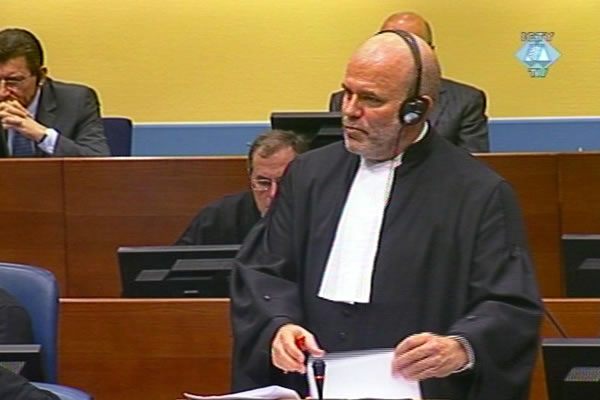Home
AMERICAN LAWS FOR GOTOVINA'S DEFENSE
In an effort to prove that the shelling of military targets in civilian areas is not against the military doctrine of all countries, General Ante Gotovina's defense counsel has referred to the 1956 US Manual on the Law of War. Harry Konings, a lieutenant-colonel in the Royal Dutch Army, pointed to differences between the American and Dutch approaches
 Greg Kehoe, branilac Ante Gotovine
Greg Kehoe, branilac Ante Gotovine On the first day of Harry Koning’s cross-examination the defense of Croatian general Ante Gotovina – charged together with Ivan Cermak and Mladen Markac with crimes against Serb civilians in Krajina in August 1995 – tried to contest his claim that the shelling of Knin and other Krajina towns during Operation Storm was unlawful. In his expert report drafted for the prosecution, the Dutch lieutenant-colonel concludes that the Croatian Army and police used artillery without a particular military purpose, to cause panic among civilian population. In his examination-in chief the witness argued that the shelling of military targets in towns was not justified by military necessity because the advantage to be gained by their destruction was minimal while the risk of collateral damage was too great.
Gotovina’s defense counsel Greg Kehoe tried to prove that various military doctrines have different views of warfare and care for civilians in the course of attacks. To corroborate this, the American lawyer referred to the Manual on the Law of War issued in 1956 by the US Department of Defense. The Manual notes that ‘civilians cannot be targeted in an attack’; however, artillery attacks on military targets located in civilian areas are not prohibited. Konings replied that rules changed. Furthermore, while he worked on his expert report Konings relied in part on the Dutch military doctrine that differs substantially from the US doctrine. Konings also brought up the current rules of engagement of the allied forces in Afghanistan which stipulate that fire cannot be opened on military targets if there are civilian buildings within 500 m perimeter.
In his examination-in chief the witness compared the shelling of Knin with the four-year siege of Sarajevo; this prompted the defense counsel to put it to him that the two situations were entirely different. The Serb army attacked Sarajevo randomly every day for four years and never entered it, while the Croatian armed forces attacked Knin to liberate it. Konings agreed only in part with this suggestion, saying that the circumstances were indeed different but that the artillery attacks on areas in Knin where there were civilians are not justified.
At the very beginning of the hearing today, the defense counsel tried to contest the expertise of the witness showing the statement he had given to the OTP investigators in the case of Dragomir Milosevic, former commander of the Sarajevo-Romanija Corps. There Konings said that he didn’t consider himself to be an artillery expert. What he meant, Konings replied, was that he couldn’t evaluate his own expertise. However, Konings emphasized, many people, including his superiors, consider him to be an expert because of his comprehensive knowledge of artillery and ground forces in general.
Defense counsel Kehoe will continue his cross-examination tomorrow. According to his calculation, it should last for at least two full working days.
Linked Reports
- Case : Gotovina et al. - "Operation Storm"
- 2009-01-14 WITNESS: 'KNIN WAS LIKE SARAJEVO'
- 2009-01-13 CIVILIANS OR SOLDIERS IN CIVILIAN CLOTHES?
- 2009-01-12 FORENSIC FINDINGS FROM THE KNIN CEMETERY
- 2009-01-16 PANIC AMONG SOLDIERS OR CIVILIANS?
- 2009-01-19 BEST OR WORST TACTICS USED IN KNIN ATTACK?
- 2009-01-20 GENERAL GOTOVINA ISSUED ‘VAGUE’ ORDER
